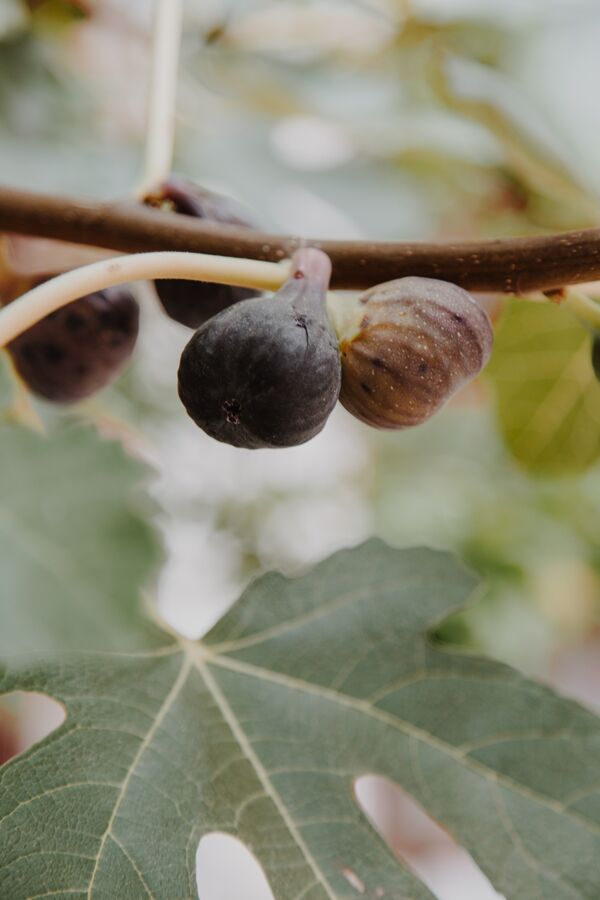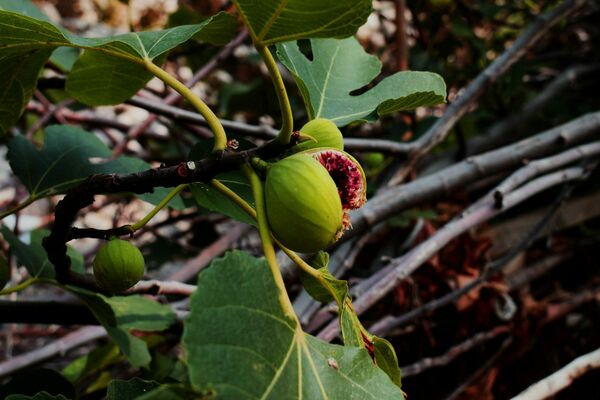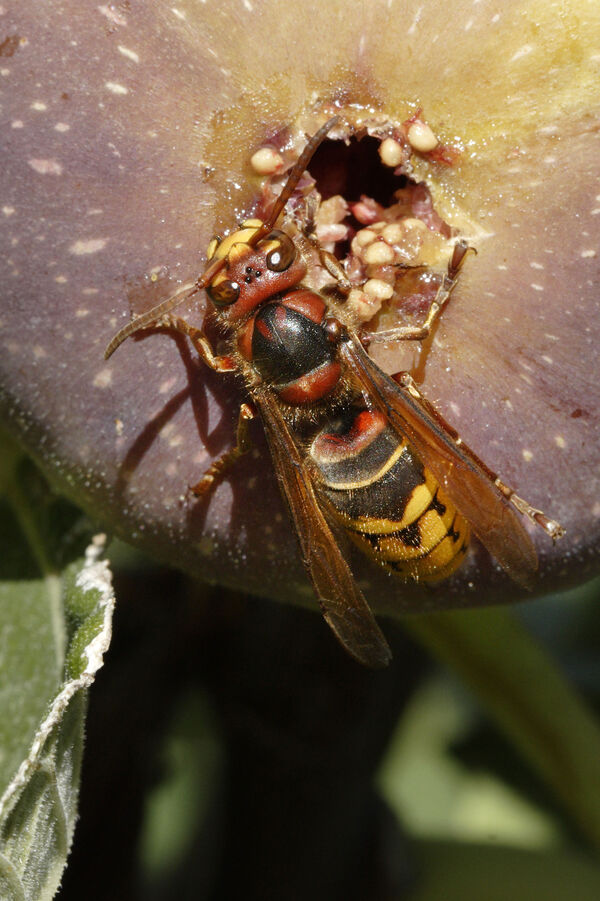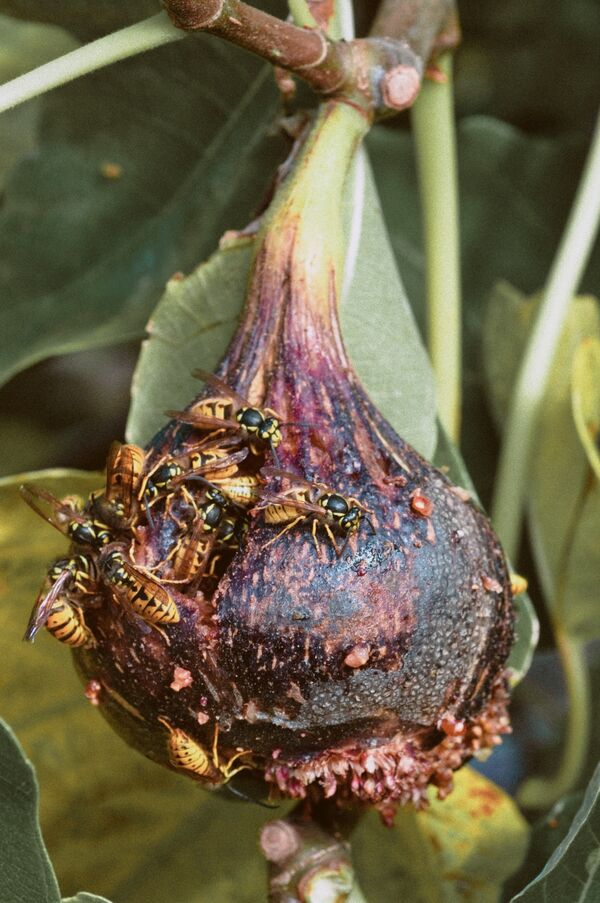
Must We Have Children?
An investigation of the biblical injunction to “be fruitful and multiply.”
Chevruta is a column that aims to address the ethical and spiritual problems confronting the left. For each installment of the column—named for the traditional method of Jewish study, in which a pair of students analyzes a religious text together—Jewish Currents will match leftist thinkers and organizers with a rabbi or Torah scholar. The activists will bring an urgent question that arises in their own work; the Torah scholar will lead them in exploring their question through Jewish text. By routing contemporary political questions through traditional religious sources, we hope to discover new and unexpected avenues for inquiry into today’s most pressing problems.
You can find an audio version of this conversation here, and a stand-alone source sheet for group study here.
The famous phrase “be fruitful and multiply”—פרו ורבו (p’ru u’r’vu) in Hebrew—first appears in the book of Genesis as a blessing given by God to the first humans, but was later interpreted by rabbinic commentators as a commandment. Today, this commandment is typically invoked as the slogan of a conservative theology that understands biological procreation as the most essential form of creation, and holds up the nuclear family as the paradigm for human kinship structures.
A very different vision of kinship comes through in the feminist theorist Sophie Lewis’s 2022 book, Abolish the Family: A Manifesto for Care and Liberation. For Lewis, family is “the name we use for the fact that care is privatized in our society,” an institution that, as radical thinkers have argued for centuries, extracts unpaid work, enforces violent intimacies, and suppresses alternative possibilities. Lewis imagines, by contrast, a world of comradely collective mothering “in which all people are cared for by many.”
Perhaps surprisingly, given the heteropatriarchal reputation of the Jewish textual tradition, Lewis’s book struck me as distinctly rabbinic. The rabbis were strikingly ambivalent about the injunction to be fruitful and multiply—in part because their profound love of Torah, and of each other, at times placed them in tension with this foundational mitzvah.
In our chevruta, Lewis and I explore a Talmudic text from tractate Yevamot that confronts a rabbinic figure who has declined to procreate. Through his example, the rabbis of the Talmud normalize a discomfort with this seemingly essential practice of biological procreation, and offer us a way to complicate—and potentially subvert—the status of procreation in the rabbinic mind and in our world.
—Laynie Soloman
Laynie Soloman: What’s bringing you to this conversation about remaking kinship relationships today?
Sophie Lewis: The question I was interested in posing to you is essentially, “Why should we make new human life?” I know the biblical injunction is to “be fruitful and multiply.” Is there a way to do this without necessarily procreating? I’m quite attached to the political and ethical importance of celebrating so-called childless or child-free lives. And there’s stigma and a sense of failure that is unjustly put on people who, for whatever reason, don’t or can’t procreate. I’m curious what the Torah has to say about this.
What brings you here, Laynie?
Laynie: I spend my days teaching Talmud at SVARA, a yeshiva for queer and trans folks. I find that in our community I am able at times to tap into modes of relationships that touch the utopic models of care imagined by family abolitionists. And I’m moved by the opportunities that we might find in our tradition to interrogate and explode notions of kinship that are hegemonic right now.
The text that I brought for us goes right into the belly of the beast, so to speak, and I’m excited about what we will make of it. But first, are there any assumptions that you’re bringing to the text before we get to meet it on its own terms?
Sophie: I suppose I have a sense that procreation is a mandated practice in Jewish tradition, as it is in most traditions I’m aware of. And a vague expectation that blood will hold a lot of importance.
Laynie: So the text I’ve brought is from the Talmud.[1] And it’s a text that, when I learned it, felt extremely queer to me. But it’s not generally read that way, which is how it got to stay in the tradition. So I’m excited to see where, if at all, you find those resonances.
Sophie reads.
It is taught in a Baraita[2] that Rabbi Eliezer says: Anyone who does not engage in the mitzvah to be fruitful and multiply is considered as though he sheds blood, as it is stated: “Whoever sheds the blood of man, by man shall his blood be shed,”[3] and it is written immediately afterward: “And you, be fruitful and multiply.”[4]
Laynie: So we’re already in the world of blood, as you predicted, Sophie. What’s your sense of this first paragraph?
Sophie: On its face, it’s very startling. It seems to be saying that a failure to make babies is tantamount to murder. I guess I’m not entirely convinced by Rabbi Eliezer’s logic here, that we can take something particular from the fact that a statement about murder being punished with execution is right next to an injunction to be fruitful.
In my work, you’ll see that I’m really interested in the idea of a sort of “fruiting,” a multiplication of relations. There’s something interesting about this phrase—it’s a literary chiasmus—“whoever sheds the blood of man by man shall his blood be shed.” It may be as simple as what I said: “If you commit a murder, you’ll be executed by your fellow man.” But reading it a bit aslant, you might say, actually, is this a line from Beyoncé? Like, “If you hurt me, you hurt yourself”?[5] On one level, it seems to be saying that if you shed humanity’s blood, you’re shedding your own blood.

Laynie: Part of what you’re saying is that Rabbi Eliezer is not wrong. He’s stating something true: Without structures of care, people die.
Sophie: Yeah, absolutely. My first book was called Full Surrogacy Now and is often still, unfortunately, misunderstood—especially by people who haven’t read it—as being some kind of call to expand the practice of gestational surrogacy, in which “commissioning parents” hire a “third party” to do the work of pregnancy. Interestingly, surrogacy has a lot of biblical and Talmudic precedent: In Genesis, for example, the slave Hagar bears a baby, by Avram, on Sarai’s behalf.[6] But my book is very critical of the whole edifice of kinship-as-private-property, and while I’m critical of the surrogacy industry as it currently operates, I’m also arguing that “unassisted,” non-surrogate kinship doesn’t exist. I invite everyone to recognize surrogacy relationships everywhere, to make them explicit, and to multiply them, even knowing that it might be somewhat scary if we got to a point where we aren’t able to tell anymore who the “proper” parent of anything even is. That’s what “full surrogacy” would be: a situation in which the more broadly collective nature of mothering has dissolved the patriarchal institution of motherhood.
I’ve always thought [feminist theorist] Donna Haraway’s slogan, “Make kin, not babies” would be better phrased, “make kin, and maybe babies.” She’s actually quite against human procreation right now, and I’ve wrestled with this publicly because I think that political line isn’t very promising—the sheer number of human beings is much less of a factor in the ecological crisis than our capitalist mode of production, and as far as I can tell, whenever it’s been tried in the past, the politics of anti-natalism have always been racist, colonial, classist, and matrophobic. But I’m indebted to Haraway’s insistence on kin-making and on a practice of comradeliness, a knitting together of ourselves and others across boundaries, including potentially species boundaries. That’s what I mean when I speak of “fruiting and multiplying.”
Laynie: I love that. I learned this text with the patriarchal sense of ownership attached to it, in the way that Rabbi Eliezer might be saying, “If you don’t have children, you will cut off your biological and patriarchal bloodline, and therefore you will die.” I’m curious if there’s a way to read Rabbi Eliezer with this expanded read of being fruitful and multiplying in mind.
Sophie: I actually think it’s always a bit impossible to practice blood-based inheritance through the construct of the family. That in itself is a bit fictive. There’s this classic observation in feminist philosophy that until recently with DNA testing, you could not be sure of paternity, which is a driving factor in some of the anxieties to ensure that blood continuity can even be held or enforced.
Laynie: The anxiety and the emphasis feel like they go hand in hand.
Sophie: It’s interesting to think about how the ethical prescription here could also be interpreted as non-biological: If you aren’t kin-making in some way, if you aren’t multiplying relations, if you aren’t tending to fellow humans, you’re shedding blood. You could perhaps see it that way.
Shall I read the second part?
Sophie reads.
Laynie: So we have a sort of similar mode of thought here to Rabbi Eliezer, taking two verses that are near each other and deriving meaning from their juxtaposition. Whereas Rabbi Eliezer hooked the emphasis of being fruitful and multiplying on “shedding blood,” Rabbi Ya’akov is hooking it on the statement, “for in the image of God He made man.” So there’s something about being fruitful and multiplying that’s about the magnification of God; while refraining from being fruitful and multiplying undermines or diminishes God’s image. What do you think?
Sophie: I suppose it’s interesting—I mean, talking about God, how did He procreate?
Laynie: Aha! God’s “procreation” was creation.

Sophie: Still, it’s a lot, isn’t it, this idea that you’re insulting God’s image because you’re not making a baby? Give me a break.
Laynie: I noticed that this statement from Rabbi Ya’akov did land harsher with me than Rabbi Eliezer’s, which surprised me considering that in the latter, the nonreproductive adult is like a murderer.
Sophie: Because Rabbi Eliezer leaves it on a mortal plane.
Laynie: Yeah. With Rabbi Ya’akov, it’s cosmic and mythical and transcendent.
Sophie: There is a sense of thwarted potential that people sometimes feel if they haven’t been able to have children. I think this hangs over the culture in some sense: That if you don’t have children, you’re insulting some cosmic principle. You’re thwarting your purpose.
Laynie: Personally, I feel this internalized transphobia where I’m like, “I’m not doing what I was put on Earth to do with my reproductive capacities.” Is that what Rabbi Ya’akov is saying? Or is Rabbi Ya’akov more like, “No, the babies that would have emerged! That’s the divine image that’s being undermined”? Both feel really stressful to me.
Sophie: So far we’re doing great. No pressure on anybody.
Laynie: Should we bring ben Azzai into the room?
Sophie reads.
Ben Azzai says: It is as though he sheds blood and also diminishes the Divine Image, as it is stated: “And you, be fruitful and multiply,” after the verse that alludes to both shedding blood and the Divine Image.
Sophie: So I guess we’ve got both now.
Laynie: That’s right. Why choose when you can have both?
Sophie: But wait!
Sophie reads.
They said to ben Azzai: There is a type of scholar who expounds well and fulfills his own teachings well, and another who fulfills well and does not expound well. But you, who have never married, expound well on the importance of procreation, and yet you do not fulfill well your own teachings.
Laynie: Harsh.
Sophie: Sick burn. Who is the “they” here, Laynie? Just general members of the community?
Laynie: Yes, it’s like a community of scholars. They’re saying, essentially: “Nice story, but where are your kids?”
Sophie: Shall I read his response?
Sophie reads.
Ben Azzai said to them: What shall I do, as my soul yearns for Torah, and I do not wish to deal with anything else. It is possible for the world to be maintained by others, who are engaged in the mitzvah to be fruitful and multiply.
Laynie: I’m always struck by this moment. I just so appreciate that the illusion of perfection is nowhere to be found here. Ben Azzai is grappling with his misalignment with the tradition—struggling with what we might understand as a nuclear family structure, and perhaps yearning for connection beyond that structure. And the Talmud talks about it. It’s not a secret. It’s public. We get to learn from his grappling.
Sophie: Very interesting. You know, I am so steeped in these sorts of “repro” radical artists, thinkers, and utopians from the ’60s and ’70s, including Mierle Laderman Ukeles. Ukeles was an artist in New York City who managed to invent the role of artist-in-residence at the New York Department of Sanitation, where she sought to make art out of the practices of garbage disposal that keep New York City functioning every day. She wrote a “Manifesto for Maintenance Art,” which was a sort of feminist critique of the idea of art and maintenance being completely irreconcilable, that you can’t maintain and create at the same time.
And because ben Azzai used the word “maintain,” I couldn’t help but make the connection. I mean, sure: “It is possible for the world to be maintained by others.” That is, unfortunately, how it is. There are those who are enabled to be in public by all of those who are relegated to the spheres of the noncreative. This gendered division of labor operates on a planetary scale as well, in a neocolonial script: who gets to be “creative” versus who is merely lifemaking, and so on. Kalindi Vora and Neda Atanasoski call the technologically mediated concealment of the global north’s planetary support systems “surrogate humanity.”
Yet even as I know that the division between art and maintenance has to be overcome—that we have to come up with a just way to distribute the prerogative to do both—I can’t help but laugh reading ben Azzai. It’s very relatable for someone like me, who is also a scholar, whose soul yearns for books. I’m literally on a writing retreat right now, where other people are maintaining me, preparing meals for me while I get to hole up with a stack of books in a cabin, working on a manuscript. I love the privilege and pleasure of this. So I can totally hear myself being like, “Ah, what can I do? My soul yearns for Torah.” To say, “Listen, it is okay for other people to do that, to maintain all of us, to hold down the propagation of the species.”
Laynie: So in this read, mothering is maintenance work.
Sophie: Yes. Though I should specify that the traditions of thought, practice, and struggle that I’m interested in—for example, queer Black survival histories—would argue that mothering in certain moments or in certain conditions can go beyond maintenance and cross over into the realm of collective self-creation. This is the tradition that gives rise to the radical feminist Audre Lorde’s observation that Black women “can learn to mother ourselves.” That observation is tied to the practice of learning how not to dominate children: You learn to undo domination in yourself through extending a different form of mothering to those for whom you are duty-bound or ethically compelled to care. So things can change through mothering—they don’t have to be simply maintained.

Laynie: When we started with Rabbi Eliezer, I was thinking of “priya u’reviya”—this fruitfulness and multiplication—as a creative project, especially in the broadened sense of multiplicity of relationships that we’ve been discussing. It’s interesting now to see how ben Azzai thinks of that as a world-maintaining project as opposed to a world-building project. I wonder if it’s a misreading on his part.
Sophie: When I talk about fruiting and multiplying as creative, that does go against the general sense. I mean, the very word “reproduction”—it sort of says on the tin that it’s not adding anything, it’s “doing over.” I don’t know if you’re a botanist—I am not—but my understanding of the general imaginary around fruit-bearing organisms is that if they don’t fruit, they die. A fruit tree is not recognized as something that labors creatively. It’s doing its thing, fruiting—just doing nature. That binary between nature and culture has been epically formative within patriarchy. So right at the top of this conversation, when I said “fruiting” in a kind of queerly appreciative sense—that already goes against certain inherited patterns of patriarchal thought that undergird capitalism, where there is a neat binary between production and reproduction.
Laynie: I wonder what ben Azzai’s approach would have been had he had that definition of fruiting and multiplying.
Sophie: But then it does sound like he’s saying, “Oh, I’m just a dusty nerd with my pile of tomes. I’m sorry I can’t contribute to the creation of the world.” “Maintaining” in this reading becomes synonymous with “living.” In his description, it seems that being a Torah scholar could be read as perhaps less creative in Ukeles’s sense, where the substance of sociality and care is clearly creative. He implies his preference for study is self-indulgent, doesn’t he? He’s merely indulging his personal yearning.
Laynie: Right. But it’s interesting: The word for “yearn” that he uses comes from the three-letter Hebrew root חשק (chet, shin, kuf), which signals that this is a kind of yearning that is about love and lust. It’s the kind of love that we might imagine, in some theoretical, mythical world, could lead to procreation. That’s the kind of love ben Azzai has for Torah. It’s the kind of love that I have for what I imagine when he says Torah—meaning not only the practice of learning in isolation, but also of the community of scholars, and the enterprise of Torah community. He’s like, “This is where I feel lust and love and care.
Sophie: Yeah, that’s very relatable to me, because I’ve always felt libidinally magnetized by writing. I think that writing has its own erotics, its own sociality, its own intertextual communion. I’ve just started A.V. Marraccini’s newly published book of criticism, We the Parasites, where she conceptualizes her relationship to texts and criticism as the relation of a wasp to a fig. It’s an inseminating role, as well as a kind of self-abnegating role, because the wasp dies, but fertilizes. I’m thinking about how writing and authorship is fictive too, just like kinship—and how it can be creatively remade in the same ways. And if anyone knows that, it’s Torah scholars, who are constantly speaking with and through and against each other’s words, across time—almost kin-making in that way.
I’m now remembering the passage you pointed me to from the contemporary Jewish practical guidebook Peninei Halacha,[9] that tries to square this circle that we’ve been tracing about whether you’re allowed to not walk the walk about baby making.
Laynie reads.
We see that there is only one mitzvah one can engage in and thereby, under pressing circumstances, abstain from the mitzvah of procreation—the mitzvah of Torah study. This is because Torah study itself adds life to the world. The fact is that although ben Azzai did not engage in procreation, he delved deeply into the great importance of the mitzvah and expounded upon its great value. Certainly, many children were born as a result of his teachings.

Sophie: Do you know, Laynie, where that certainty comes from? Did they just make that up?
Laynie: So this certainty, I think, is masking a tremendous amount of uncertainty. Ben Azzai knows intuitively that what he’s doing is actually meaningful and good and sacred, and that he should keep doing it. This tension comes through in all sorts of halachic sources, where it’s like, “You gotta fulfill this mitzvah of being fruitful and multiplying, and you’ve also gotta learn Torah.” I think that this piece of the Peninei Halacha where it says that “Torah study itself adds life to the world” is so interesting. It seems to be affirming that studying Torah is also something natural, something that contributes to the process of world-building through learning together.
Sophie: I want to bring it back to parasites. The way ben Azzai has to defend his position about being maintained by others made me think about all the feminist biology that has been written in almost Talmudic disagreement with patriarchal traditions of biological science. A familiar patriarchal version imagines that a so-called “selfish gene” eugenically ensures the “survival of the fittest” via heredity. Feminist biologists have contested this idea: They see the world being made not through competition but through mutual co-production and interreliance. Part of their work has been to challenge the very concept of parasitism, showing that a lot of organisms classically designated as parasites are actually symbionts—in other words, they’re mutualistic. Perhaps asymmetrically so, but nevertheless! We ourselves are incredibly needy and dependent on others, but this “debt” isn’t wrong or pathetic or unethical. Perhaps this relates to the previous chevruta, about debt: Even though leftists have often used the idea of parasitism to condemn capitalists, landlords, the British royal family, and so on, I ultimately don’t think it’s a good move to imply that any of us actually “earn our keep,” and deserve to live because of that.
That’s something I think we can quite easily link to our conversations. Some people can abstain from the mitzvah of making more biological life because they are making more life through text. To expound in text is itself generative of life, generative of social understanding, generative of children, maybe, in the sense of disciples, students, or comrades. In a class society, the anxiety about being someone who doesn’t contribute and is purely maintained is an understandable one, I suppose. When others don’t get to do what they love to do, doing what we ourselves love to do can feel wrong, undeserved. We have a pretty common idea in my political tradition of “from each according to his abilities, to each according to his needs.” I would really like to see that improved: from each according to her desires! Because I don’t want to feel compelled by a moral prescription that would force anybody to go against their lust, their calling, and insist that everybody contributes some kind of “equal amount,” necessarily. We’re very uncomfortable as a culture, I think, with the idea of being indebted, the idea of owing lots of people your life—but we do! We fundamentally do. Perhaps we are all parasites, and that’s okay.
Laynie: What I’m getting from this conversation is we’re all parasites and we’re all parents. The validity of ben Azzai’s choice is predicated on his ability to also be a parent in the broadest sense, as you said, to “banim,” which is incidentally the word for children, but also disciples. The suggestion is that the rabbis of the Talmud see their primary family as Torah itself: They participate in tremendously deep, accountable relationships in their learning communities. They live with their learning communities for long periods of time. They have people that they call their partners, their chevrutot, with whom they study. And all of these are real, life-sustaining partnerships. Ben Azzai is a parent of ideas and concepts. He is a parent of Torah and a parent of students and a parent of everything he says and creates.
Sophie: We are left with this image of a scholar who is a mother to untold scholars in turn, across the generations.
Laynie: To us, right now.
Jewish Currents contributing writer Raphael Magarik contributes to the creation of this column.
Yevamot 63b-64a
An early tradition in Jewish oral law not collected in the Mishnah
Genesis 9:6
Genesis 9:7
Sophie is paraphrasing a lyric from the song “Don’t Hurt Yourself” from Beyoncé’s 2016 album, Lemonade.
God gives Avram and Sarai the names Abraham and Sarah in the following chapter of Genesis.
Genesis 9:6
Genesis 9:7
Peninei Halacha was written by Rabbi Eliezer Melamed. The passage Laynie reads is from Simchat HaBayit U'Virchato 5:2.
Laynie Soloman is a teacher and Torah-lover who seeks to uplift the piously irreverent, queer, and subversive spirit of rabbinic text and theology. They are the associate rosh yeshiva at SVARA.
Sophie Lewis is a writer living in Philadelphia. Recently, she published Abolish the Family: A Manifesto for Care and Liberation (Verso, 2022). Her first book was Full Surrogacy Now: Feminism Against Family (2019).

